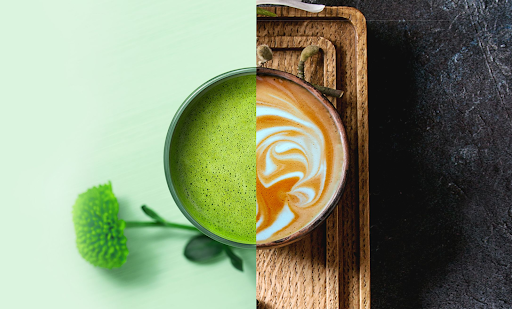Let’s get started by considering how much you know about matcha caffeine. Besides being extremely flavorful and healthy, matcha is also a great source of caffeine energy. Every matcha tea company we discovered online probably mentions the caffeine content on the label or description.
Today, in our quick article, we will be outlining what high-quality matcha is, some FAQs, and most importantly, where to buy matcha.
What is Matcha Green Tea?
It is a famous Japanese tea derived from the Camellia sinensis plant. Naturally, this plant produces multiple cultivars–some are great for black tea, some are best for green tea, and the finest are highly suitable for matcha. In general, there are two key points that differentiate regular green tea from an authentic matcha grade.
- First, the green tea plants are usually shade-grown, altering the flavor, caffeine, and L-theanine levels.
- Secondly, once leaves are harvested and dried, the stalks and veins are removed, and the tea leaves are stone-ground into a fine powder.
In layman’s terms, you may have to whisk the matcha powder with water, while green tea requires the tea leaves to be steeped in water for 3-5 minutes. Brewing a fresh cup of matcha tea is described as satisfying as brewing coffee.
Surprisingly, the highest grades of matcha – Ceremonial and Organic are consumed as a tea. Traditionally, the Japanese also practice the same during their tea ceremonies. Whereas the culinary grade is for flavoring, baking recipes, and coloring foods. Have you already experienced matcha’s rich, green, and earthy taste? Let us know how you usually like to have it – with hot foamy almond milk or chilled coconut milk.
Few FAQs Were Answered About Matcha Tea Caffeine Levels.
-
Is there caffeine in matcha tea?
Of course, yes. Matcha contains higher levels of caffeine than any other ordinary green tea. However, the presence of amino acids and antioxidants reduces caffeine stimulation. Roughly, every serving may have around 60 mg of caffeine.
-
Is matcha stronger than ordinary coffee?
In terms of caffeine, matcha tea has less content than a regular cup of coffee but more than a single shot of cappuccino. Apparently, both coffee and matcha have a slightly bitter and stronger taste, but they are very different in comparison.
-
Is matcha caffeine bad?
The caffeine levels in a matcha cup are way lower than the FDA’s daily suggested limit of 400mg. As mentioned earlier, matcha has an amino acid, L-theanine, that smooths and prolongs the effects of caffeine. Ultimately, you won’t get the jitters and crash you would casually expect with coffee or other highly caffeinated energy drinks.
Where To Buy Matcha Tea Powder – Local Stores or Online?
Matcha is indeed everywhere – in local stores and online stores. So why not buy from a trusted matcha tea company online that introduces the finest quality and affordable range of matcha grades. If you are just getting into matcha or even want to upgrade your current matcha label, keep reading.
Compared with many other options online, we have found DōMatcha quite affordable with higher quality standards. Their wide range of matcha made in harmony with authentic traditional Japanese practices is something that many people are already loving. Every matcha grade is 100% Japanese matcha with no sweeteners and fillers added and is accompanied by an internationally certified organic designation.
END NOTE
So what are you waiting for? Now, explore more of their high nutritional, flavorful, and gorgeous green matcha options.
